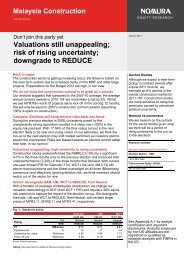Download PDF - ETP - Pemandu
Download PDF - ETP - Pemandu
Download PDF - ETP - Pemandu
You also want an ePaper? Increase the reach of your titles
YUMPU automatically turns print PDFs into web optimized ePapers that Google loves.
<strong>ETP</strong> ANNUAL REPORT 2011<br />
Business Opportunities<br />
Global demand for oils and fats, including palm oil, has grown<br />
in the last decade driven by increasing world population, higher<br />
incomes and changing dietary habits. Malaysia’s palm oil industry<br />
is expected to grow over the next 10 years driven by three<br />
business opportunities worth RM57.6 billion by 2020. These<br />
Business Opportunities (BOs) involve expansion of upstream<br />
activities, development of existing downstream activities<br />
and development of biodiesel activities. The BOs address key<br />
challenges to the industry which are increasing mechanisation<br />
to raise upstream yields and filling the knowledge and expertise<br />
gaps for downstream jobs.<br />
Business Opportunity 1<br />
Expansion of Existing Upstream Activities<br />
Besides the steps taken in Palm Oil EPPs 1-4 to sustain upstream<br />
activities, Malaysian plantation companies have begun to look for<br />
land suitable for plantations abroad, focussing in Indonesia and<br />
Africa. By 2020, companies are expected to have an additional two<br />
million hectares in Indonesia, other parts of Southeast Asia and in<br />
West Africa. This BO will potentially contribute an additional GNI<br />
of RM17.6 billion by 2020.<br />
Business Opportunity 2<br />
Development of Existing Downstream Activities<br />
Malaysia is already a major basic oleochemicals player and has<br />
potential to grow by expanding the current production with stable<br />
palm feedstock availability in Malaysia and increasing regional<br />
demand. For the food and health based segment, the gradual<br />
Summary of Palm Oil and Rubber NKEA<br />
Incremental GNI Impact<br />
2020 Target<br />
RM230.9 billion<br />
(inclusive of Rubber)<br />
Additional jobs 41,600<br />
Critical targets for 2012<br />
Palm Oil<br />
Accelerate the replanting of oil palm plantation backlog and development of new palm oil areas to 140,000 hectares<br />
•<br />
•<br />
•<br />
•<br />
•<br />
•<br />
Form 7 new regional cooperatives to group more independent smallholders together<br />
Improve labour productivity via sales of Cantas and diamond sharpening tool<br />
Improve national oil extraction rate to 21.05 per cent<br />
Encourage uptake of connection to the Feed in Tariff system by biogas plants<br />
Ensure completion of 21 biogas plants under construction<br />
Rubber<br />
•<br />
•<br />
102<br />
Accelerating the replanting of rubber estates backlog and development of new rubber areas by smallholders to 51,000 hectares<br />
Ensure 12,000 tonnes of production of Ekoprena and Pureprena<br />
increase in demand backed by a growing population is expected<br />
to drive the increase in production of palm-based food and health<br />
products. This BO will potentially contribute an additional GNI of<br />
RM11.2 billion by 2020.<br />
Business Opportunity 3<br />
Development of National Biodiesel Activities<br />
Malaysia has a large amount of unused biodiesel production<br />
capacity. Out of the national capacity of 3.5 million tonnes, only<br />
117,000 tonnes were produced by the biodiesel plants in 2010,<br />
almost all of which are exported. To accelerate the development<br />
of biodiesel usage in Malaysia and to reduce the CPO stockpile<br />
in the market, the Government has introduced B5, a 5 per cent<br />
biodiesel blend with petroleum diesel in 2011 in Klang Valley,<br />
Negri Sembilan and Malacca as a start. This BO will potentially<br />
contribute an additional GNI of RM1.6 billion by 2020.<br />
Moving Forward<br />
The Malaysian palm oil and rubber industry faces immense<br />
competition from fast-growing competing producers such as<br />
Indonesia and Thailand. The way forward is through productivity<br />
improvements as well as accelerating the replanting and new<br />
planting initiatives besides tapping into niche markets as<br />
first movers to command a significant market share ahead of<br />
competing nations. Continued efforts and collaborations between<br />
the Government and the private sector will be vital to ensure that<br />
the EPPs stay on track to meet the GNI target of RM230.9 billion<br />
GNI in 2020.








